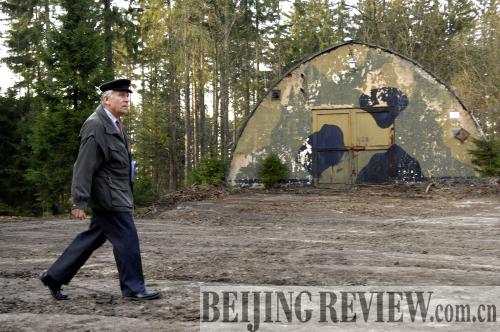|
 |
|
POINT OF CONTENTION: This file photo shows an abandoned barrack at a former Soviet Army base in Mirosov, the Czech Republic. It was reported that the site could have served as a logistic center for the scrapped U.S. radar base in the country (XINHUA/AFP) |
In 2007, Russia suggested the United States use information from Russia's existing systems in Azerbaijan and south Russia instead of building radar systems in the Czech Republic. But the United States refused. On August 17, 2007, faced with a U.S. push in unilateral power, Putin adopted a hard line by ordering the massive redeployment of strategic cruisers in the Mediterranean Sea and Atlantic Ocean.
From January 23 to early February 2008, Russian aircraft carrier battle groups and strategic bombers conducted the largest joint maneuvers in the Atlantic since the end of the Cold War. The large scale, long time and sheer numbers of participating warships and bombers drew tremendous attention from Western countries.
The moves showed Russia would no longer concede in strategy or appease the West in its policies. It drew a clear red line, moreover, which was not to be crossed.
At the Munich Conference on Security Policy in February 2008, Putin sharply criticized the unilateral policies of the United States. At the dawn of the G8 summit in early June that year, Putin likewise gave a stark warning on the U.S. deployment of missile interceptors in Eastern Europe.
Putin said if the United States insisted on this program, Russia would not only redeploy missiles targeting Europe, but also abandon its obligations under the 1987 missile treaty with the United States. Then, on August 8, 2008, Russia engaged in military hostilities with Georgia. Shortly after, it recognized the independence of South Ossetia and Abkhazia from Georgia before establishing diplomatic relations with the two breakaway regions.
The move sent a clear signal that Russia totally gave up on joining the West. Putin's successor, President Medvedev likewise called for establishing a new European security mechanism to grant Russia the power of rejecting NATO's expansion.
High stakes
After lengthy negotiations, the Czech Republic and the United States signed an agreement on building a missile defense radar system in the Czech Republic in July 2008. The next month, Poland and the United States reached an agreement on building a missile defense base in Poland, planning to deploy 10 interceptor missiles inside Poland by 2013. As these agreements could provide a strategic shield for the Czech Republic and Poland, helping them to withstand their biggest threat of security—Russia, both sides called them win-win outcomes.
In response, Russian Ambassador to Belarus Alexander Surikov warned on August 6, 2008 that Russia might deploy tactical missiles and strategic bombers in Belarus.
Meanwhile, military observers noticed Russia chose the Bay of Biscay as the location of its 2008 navy and air force exercise. This choice was unusual. The Bay of Biscay is bordered by both the west coast of France and the north coast of Spain.
Transport routes extending from that location could easily reach the Caribbean Sea and the east coast of North America. Therefore, it is not only important for travel routes in the Atlantic, but also can serve as a militarily important location.
What's more, on January 4 this year, Russia secured approval for the permanent dockings of its warships at friendly ports all over the world. The Russian Navy further planned to construct a permanent naval port in Abkhazia.
Obama's decision to scrap the missile defense shield is an important part of adjustments he has made to both domestic and foreign policies of the former Bush administration since he took power in January 2009. Indeed, U.S.-Russia relations are most difficult among all foreign relations for the Obama administration.
Russia has the world's largest territory, produces the world's most oil and natural gas, and possesses an ample supply of strategic and tactical nuclear weapons to contend against the United States. And although disputes and confrontations exist between the two powers, the United States and Russia share common interests, too. Neither one wishes to see Iran become a nuclear power or launch an arms race in the Middle East.
At the same time, both wish to see Afghanistan stabilized, while hoping to drive Al Qaeda militants out of the border areas between Afghanistan and Pakistan. Indeed, Russia has always been a good channel of supply for NATO troops in Afghanistan.
Both sides, moreover, are committed to preserving the nuclear balance, while looking forward to reaching a new agreement on strategic arms reduction by the end of the year. Washington also needs Russia's support in dealing with the financial crisis and other global issues. Therefore, it is not surprising that the United States sacrificed the interests of Poland and the Czech Republic to repair U.S.-Russia relations. Nonetheless, it is not expected to neglect the two countries. Indeed, U.S. Vice President Joe Biden's visit to the two nations in October was suited for this purpose.
The author is a professor at the China Foreign Affairs University | 